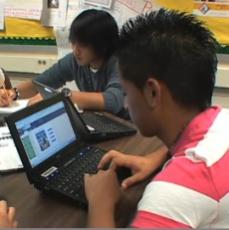2012-2-1

Photo: VOA - J. Soh
Students in Fairfax County, Virginia, use their online textbooks in class
This is the VOA Special English Education Report.
Electronic books have changed the way many people read for pleasure. Now online textbooks are changing the way some students learn and some teachers teach.
More than one hundred seventy-five thousand students attend the public schools in Fairfax County, Virginia, outside Washington. Last year, the school system used digital books in fifteen schools. This school year, middle schools and high schools changed from printed to electronic textbooks in their social studies classes.
Luke Rosa is a history teacher at Falls Church High School. His students work on school laptop computers. He explains the idea to them this way.
LUKE ROSA: "I mean, it's just like a regular textbook, except it's got it all online."
Peter Noonan, an assistant superintendent of schools, says with electronic textbooks, publishers can quickly update the content with the latest information.
PETER NOONAN: "The world's changing consistently. And the online textbooks can change right along with the events that are happening."
Digital books also cost less than printed textbooks, he says.
PETER NOONAN: "Usually it's in the neighborhood of between fifty and seventy dollars to buy a textbook for each student, which adds up to roughly eight million dollars for all of our students in Fairfax County. We actually have purchased all of the online textbooks for our students for just under six million dollars."
So what do students think?
MELANIE REUTER: "I don't have to carry a textbook around, so that's nice."
MARIA STEPHANY: "I don't like it because the Internet sometimes, its like, doesn't work."
BRIAN TRAN: "You can highlight your work. You can leave notes on your work and it'll all be saved onto your account. It's a lot better than a regular textbook."
Social studies teacher Michael Bambara says the e-book he uses in his government class is better than a printed textbook. He likes the way it has materials for students with different levels of reading skills.
MICHAEL BAMBARA: "Particularly this book, that I use in government has differentiated reading levels. So a person can individualize their learning and I can individualize their instruction."
But the students also need access to the Internet when they are not at school. About ten percent of students in Fairfax County do not have a computer or online access at home. Stephen Castillo is one of them.
STEPHEN CASTILLO: "Pretty much I go to, like, the library, I guess, or go to a friend's house."
Public libraries in the county have free Internet. There are also after-school computer labs as well as computer clubhouses supported by the county. Middle school student Slieman Hakim is happy about that. He says his family has to share a single computer at home.
SLIEMAN HAKIM: "All of my family works on a computer, my sister and me both do our homework on it. So I come here to do my homework. It's good."
Other school systems in the area are also considering online textbooks. In Prince George's County, Maryland, a survey showed that sixty percent of students have computer access at home. Curriculum Director Gladys Whitehead says an e-book test project is being planned.
GLADYS WHITEHEAD: "Next year we'll just have a pilot with probably one classroom and one subject area, so that we can see, you know, what issues will come up with complete online access."
And that's the VOA Special English Education Report. We have a related video at 21voa.com. I'm Christopher Cruise.
___
Contributing: June Soh